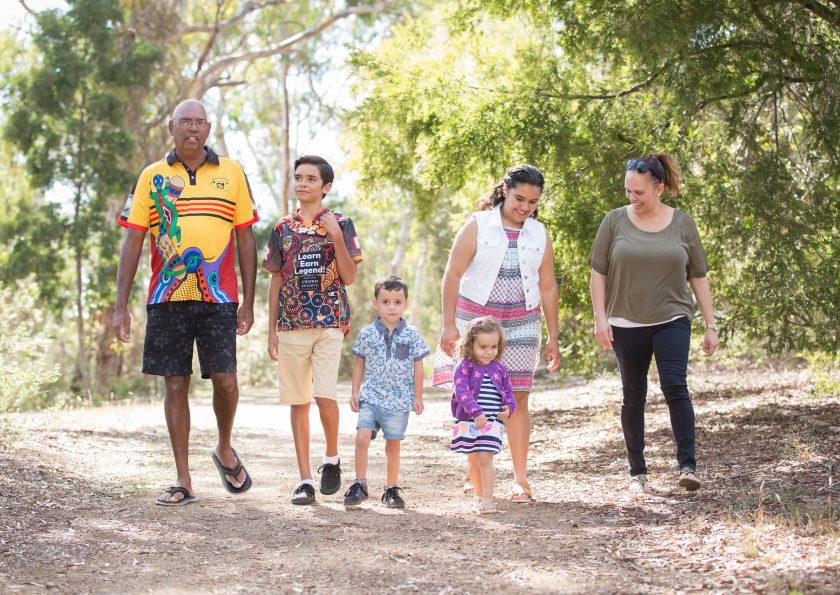
Aboriginal Affairs
Aboriginal evidence building partnership: pilot
Their Futures Matter, Coffs Harbour Aboriginal Community Care Centre Inc, and Tirkandi
Inaburra Cultural and Development Centre, 2018–19.
THE CHALLENGE
The 2015 Tune Review found that the NSW Government was failing to address the complex needs of vulnerable children and families and prevent ongoing cycles of intergenerational abuse and disadvantage, particularly for Aboriginal children and young people. Aboriginal children and families are overrepresented in NSW child protection and justice systems, and despite a history of policies and programs designed to support Aboriginal families and communities, these have not always worked, and still, there is limited evidence of ‘what works’ in Aboriginal policy contexts [11] [12].
The Review recommended the NSW Government help build the evidence of existing, locally developed Aboriginal programs and services that, anecdotally, were seen to be improving outcomes for Aboriginal children, young people, families and communities. Subsequently, the NSW Government established the Aboriginal Evidence Building Partnership project under Their Futures Matter (TFM).
THE OBJECTIVE
In 2018, TFM piloted the Aboriginal Evidence Building Partnership project (AEBP) which partnered Aboriginal Community Controlled Organisations (ACCOs) with evaluation and evidence-building experts to strengthen the capacity of the sector to collect meaningful and measurable data that demonstrate program impacts. Abcare and Tirkandi selected ARTD Consultants as their partners in the pilot.
OUR APPROACH
ARTD took an empowerment approach to engage Abcare and Tirkandi in the practice of evidence collection, monitoring and evaluation, emphasising collaboration and self-determination from the outset – ensuring cultural safety and working with, not for. ARTD worked with both Abcare and Tirkandi to:
- develop program logics for their key programs, including theories of change informed by relevant evidence and literature
- develop outcomes matrices mapping how identified program outcomes could be measured
- embed validated tools for measuring wellbeing outcomes into standard program practice
- train staff in data collection systems and processes
- support them to report outcomes regularly to TFM to inform a state-wide evidence base.
Due to the successful completion of the pilots, ARTD was then engaged to develop the policy documents for the second round of the AEBP. This involved working with TFM’s Aboriginal Co-Design and Evidence (ACE) team to develop an overarching program logic for the AEBP and transferring our knowledge on data collection and evaluation.
IMPACT
The staff at Abcare, Tirkandi, and TFM’s ACE team all report having strengthened their evaluation capacity through these projects.
Abcare and Tirkandi reported they have increased their knowledge and understanding of outcomes data collection and have begun to build an evidence base through which they can demonstrate program outcomes. As outlined below, both programs are now well-positioned to collect and analyse outcomes data and make program adjustments to achieve improved outcomes for Aboriginal people in their communities.
- Tirkandi’s new data system allows staff the access to valuable data to inform case
management. They have significantly refined their program design and are now better
positioned to continue receiving funding to support the development of young
Aboriginal boys. - Abcare staff understand the value of program logics in developing new service
components and are keen to develop outcomes matrices and embed tools to capture
outcomes for these new service streams. They have also made program refinements
based on evidence. The Personal Wellbeing Index data they began to collect during
the AEBP led them to better understand the level of uncertainty that young people
leaving care were experiencing and they have strengthened their post-program
support as a result.
SECTOR IMPLICATIONS
The AEBP pilot has made a significant contribution in developing the capacity of ACCOs in NSW to start building their own evidence base about what works for their communities. In the long-term, our work with Abcare and Tirkandi has supported them to develop a better idea of what works for their clients based on their evidence, which is critical given a long history of programs and policy directed at Aboriginal communities which were not informed by evidence.
Our work with TFM’s ACE team will also have lasting value for ACCOs in NSW, building the capacity of their Aboriginal workforce and in turn their capacity to work more effectively with the community. The policy documents, guides and toolkits developed will also support new ACCOs participating in the AEBP to build their capacity in evaluation and ability to contribute to the growing evidence base.
The Tirkandi Inaburra of today looks vastly different to that of last year. Previously, we were in a position where losing our long-term funding was a real risk, but with the expert guidance and advice of ARTD we have chartered a solid path mapping out the future of the program… A commitment to genuine partnership and self-determination underpinned our successful working partnership with ARTD and TFM. ARTD’s communication, efforts to listen and understand and their in-depth knowledge of the needs and issues related to Aboriginal communities was invaluable and greatly appreciated.
– Matt Watts, Centre Manager at Tirkandi Inaburra Cultural and Development Centre.
References
[11] Productivity Commission. (2016). Overcoming Indigenous Disadvantage: Key Indicators 2016. Canberra: Productivity Commission.[12] Stewart, M. & Dean, A. (2017). Evaluating the outcomes of programs for Indigenous families and communities. Family Matters. No. 99, pp.56–65.




